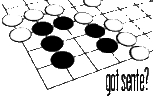What Is Go?
Go is an ancient game of elegance and strategy. Older than most other games it's compared to, Go dates back for what is presumed to be four thousand years. Go is very popular in Asia, the continent from which it was born. There are many competitions held and some people are professionals: playing Go for a living. It's popularity in Asian culture is likened to that of American college basketball, with large monetary prizes for those professionals able to gain and hold a title. Go spread into the west in the late 1800's/early 1900's and then to the United States in the 1950's. The United States now has about 20 professionals that actively compete, and popularity is still growing. South Korea has recently become the strongest nation in Go, having the best professionals that compete in the world.
A game of Go progresses as two players alternate placing black and white stones on a square grid. The classic equipment for the game is a wooden board with a grid burned on it and stones can be made from plastic, glass, or slate and clam shell. The stones are often contained in wooden or plastic bowls. There are 3 rules for playing Go, and two rules for scoring go. As opposed to most other strategy board games, victory is not absolute. One player can win in varying degrees, as the game is scored in points. At the end, white is awarded some points for going second, as it is a disadvantage. Since stones are placed and not moved, a game in progress is a record of itself. Most times, a go player can see what has happened and what will be in a game that is fifty moves from the beginning. Go is widely considered to be analogous to military strategy and business management. Also, if one isn't good at other strategy games, such as Chess and Checkers, that does not mean they will have difficulty with Go. A large portion of strategy requires abstract geometric analysis, rather than simply reading ahead moves to try to outwit your opponent.
There is a ranking system in Go that is borrowed from that of the Japanese martial arts systems. A beginner starts at 30 kyu and progresses toward 1 kyu. The player then enters a the dan category, starting at 1 dan and advancing toward 6 dan or 7 dan. If someone has reached a level of mastery exceeding 7 dan, they are giving a 1 dan professional ranking. The highest rank to be achieved is 9 dan professional. It is estimated that the average person that is serious about the game will take one year to achieve 10 kyu, then 3 to 5 years to reach 1 dan. The rules and basic tactics are simple and require maybe an hour or so to understand the premise of.
Go has many variants and can be played several different ways. Rengo is when 4 people pair up into 2 teams and play a game alternating turns against each other. Renju is a Go variant where 2 players alternate trying to place 5 stones in a line using the same equipment as Go.
Unlike Chess, Go has yet to be able to be dominated by computer technology. There are technically 100 possible opening moves for Go, and 20 possible moves for Chess. Computer scientists have difficulty making an artificial intelligence for Go, as having a computer process the outcome of every possible isn't feasible with current hardware limitations and the large amounts of possible moves in Go. And since most skilled Go players pick moves with a degree of instinct, programmers have difficulty using the assistance of skill players to write an A.I.
There are several places for people to play Go in the United States. One can play on the internet or on one of many go servers. These include Kiseido Go Server (KGS), Internet Go Server (IGS), No-name Go server (NNGS), and other less serious servers, such as Yahoo!. One can also play Go in some of the various clubs dotting the U.S. Locally, there is a Baltimore Go Club, a University of Maryland, College Park Go club, and a University of Maryland, Baltimore County Go Club.
Information was taken from the following websites. Check them out for more information.
- http://www.geocities.com/desmontes/go.html
- http://www.usgo.org
- http://www.smart-games.com
- http://newyork.villageworld.com/users/bradleym/Compare.html
Written by Ben Johnson
Mail any questions or inaccuracies there.
